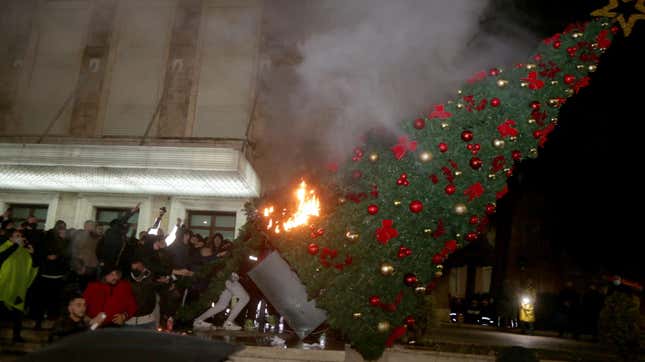It’s Beginning To Look a Lot Like Fuck This
Hating Christmas is OK, actually. Normal, even. But every December, it hits me all over again.
In Depth

You’re allowed to be single, sad, or shoeless on Christmas, but God forbid you’re a hater. As someone who dreads this holiday, I know this to be true. A deluge of books, movies, and music has words for people like me—Scrooge, Grinch, Hans Gruber. In most cases, these people exist to perform as the trauma-addled heel to the happy-go-holiday-lucky protagonist. Their destiny? Either succumb to the Christmas spirit, or be reviled by generations. The anti-Christmas contingent is anything but derivative, and yet we’re treated as such because admitting to disliking this holiday—in all of its pomp and capitalistic circumstance—is silly, strange, and frankly, un-American. And rather than allow us to hate in peace, we’re reduced to a mawkish origin story.
Well, I don’t have one of those. With the exception of too many Catholic school Christmas pageants, I can’t immediately recall anything traumatic ever happening to me in December. No one I’ve loved has tragically died or fallen ill, my family has always enjoyed the privilege of affording the kind of Yuletide that might inspire Norman Rockwell, and though I love them, I cannot personally relate to the lyrics of Last Christmas. And yet, for reasons I’ve previously never thought to interrogate, I’ve spent every year in recent memory listening to Dolly Parton’s “Hard Candy Christmas” on loop, white-knuckling it to New Year’s Day.
Apart from an entirely universal disdain for spending a lot of money and being forcibly subjected to mostly bad entertainment and only slightly more enjoyable gatherings, I have not earned the right to hate this holiday. So, I recently went to therapy. And when I say therapy, I mean I called a few psychologists to aid me in identifying the genesis of my own disdain.
“I mean, I hate Christmas,” Dr. Sarah Gundle confided less than two minutes into our phone interview. This isn’t the first time that Gundle, a New York-based clinical psychologist specializing in break-ups, trauma, family conflict and the like, has spoken about why certain people struggle with all things manufactured to be holly jolly. For her, it’s personal: Gundle is a Jewish woman doing her best to co-parent a child with a man who isn’t. Under her roof, the daughter she shares with her ex celebrates Hanukkah. Under his, well, it’s full-throttle to the North Pole.
“It’s really hard to avoid the sparkliness and the kind of seduction of Christmas,” she explained. “I find that just as a Jewish parent, the boundaries have to be laid very clearly that we don’t celebrate Christmas because otherwise, the whole world is celebrating something that just ends up bleeding into [my household]. It’s hard to not hate that thing that gets in the way of raising your kids with a Jewish identity.”
Of course, there are plenty of other reasons to hate Christmas too. For starters, all of the responsibilities thrust upon people. “There’s all this pressure that you have to spend time and money,” Gundle said. “You know, the pressures of commercialism, of gift giving, of being enough, of having a happy family gathering—most people’s family gatherings, wind up not being so happy. I think a lot of peoples’ holidays end up less joyful and more tiring.” Of course, she’s not wrong. For many of us, there’s a meal (or meals) to prepare, or the perfect gifts to buy and wrap for both the people we like (family and friends), and the people polite society tells us we should feign fondness for (co-workers). Then, there’s the gatherings—both optional and obligatory. All of the aforementioned is compounded, too, if you happen to be a woman.
Obviously, I’ve already considered these things. While I can certainly empathize, none of them necessarily make me sad—just annoyed. Gundle and I then discussed traditions growing stale: recipes that no longer excite us, decorations that after years of use don’t shine quite the same, and repetitive parties of the same people, drinking the same things, listening to the same music. In time, we concur, it all becomes a sort of mundane, ritualistic practice that sends a professional yearner such as myself right into nostalgia’s embrace.
There have been many times I’ve found myself longing for years past at Christmas. Sure, the midwest is home to Campbell’s soup casseroles and drunk driving, but it’s also the backdrop to some sweet, simple times I’ve never been able to replicate—because despite my best efforts, I’m growing older and therefore, more disillusioned. Plus, certain people aren’t alive to celebrate anymore. Christmas can make people feel absence more keenly, Gundle told me—whether it’s a lost loved one, a home to return to, or the means to make it feel as magical as the movies. But by the time the lights are hung, presents are beneath the tree, and there’s mistletoe to evade, I often feel as if I’m the only one feeling that absence—and mostly, in private. Because who the hell wants to be reminded that sometimes all the time, money, or effort in the world isn’t enough to be merry?
“It’s a time of high risk for people who are very depressed,” Gundle continued. “I know my patients always talk about feeling even more isolated, but it’s one thing to feel isolated day-to-day, and it’s another thing to feel isolated when everyone around you is seemingly happy and at home in front of the hearth.”
-

-

-

-

-

-

-

-

-

-

-

-

-

-

-

-

-

-

-

-

-

-

-

-

-

-

-

-

-

-

-

-

-

-

-

-

-

-

-

-








































